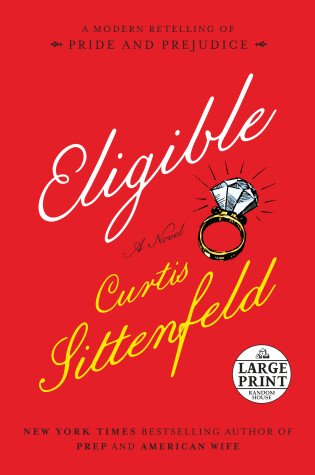Well before his arrival in Cincinnati, everyone knew that Chip Bingley was looking for a wife.
Eligible is a retelling of Jane Austen’s much beloved Pride and Prejudice. If you haven’t read it, you’re probably not going to appreciate this book nearly as much. Just like the original, it centers around a rich and slowly disintegrating (both money and relationship-wise) family that truly sometimes seems rather ridiculous…while at the same time you can’t help but empathize.
The parallels are obvious at once. The first couple of chapters – which are very short, by the way, the 488 page book has 181 chapters – are almost exact copies of the first bit of P&P, reworked in a modern setting and language. I was nervous the entire book would be like this, but it turns out it’s just setting our minds back towards the original. While the storyline’s correspondence is clear, Sittenfeld manages to put fresh life and creative twists on the plot of the original. Her prose is sparkling.
It wasn’t a secret that her mother fetishized all manner of domestic decor.
I quite literally choked on my coffee as I was reading. The humorous bits come upon you unawares. You’ve been given fair warning! She’s also managed to sneak in some heart-stirring lines that hit rather close to home (which also caught me by surprise).
Since Liz’s adolescence, when viewing television commercials that celebrated the ostensibly unconditional love of mothers for their children…she had felt like a foreign exchange student observing the customs of another country.
I was really wondering how Lydia’s elopement would be handled, since honestly, in a culture where even single motherhood is no longer taboo or shocking, what would have the same level of sucker punch that her story would have had in the 18th century? To lay it all out would be quite a spoiler, but let me assure you – she pulls it off. She more than pulls it off. With all the bells and whistles. It is very suitably altered to today’s environment and I think that in many traditional or typical families, the reaction portrayed is actually rather accurate.
Sittenfeld did substantially alter two of the more minor characters. While I was slightly disappointed she didn’t manage to hold true to the originals for purity’s sake, the changes really did make the story in some ways. Most of the other characters were easily identified not only by name but by their attitudes. Charlotte Lucas, for instance, while definitely more modern, is just as placid and unromantic as in Austen’s tale – but with a slightly warmer feel to her overall.
“Lizzy, nothing could bring me greater happiness than to have you staying at my house, freaking out about a boy.”
My favorite moment overall was the infamous meeting of Darcy and Elizabeth at his house in Pemberley, which, in the original made me break out into laughter at the absurdity and discomfort of the entire thing – and Sittenfeld managed to give the same feel to her scene, only I squirmed even harder as I could definitely relate more to the modern Elizabeth. Darcy is of course his abominable self throughout, and now we see the attraction between him and Elizabeth flare into much more than shared glances and banter during a dance.
Overall, I loved this book. It surprised me, because I was quite prepared to hate it due to my fondness for the original. I really enjoyed how the main points of P&P were translated into fresh, modern events that, I think, gave us as modern readers the same impact that Austen’s tale would have given her Victorian readers. In the words of Mr. Bennet,
“To top what’s come so far, it had better have to do with alien abduction or bestiality.”
It’s not a heavy book. Despite it’s almost 500 pages, it’s a delightfully fluffy read. I can see people tearing it apart due to it’s constant (rather laughable) “first world problems,” but that’s a large part of the point, just as Austen was satirizing her own upper class set, so we can laugh at the ridiculousness of some of the Bennet’s problems. The writing is spectacular. Jane and Lizzy are just as lovable as we’ve always known them, and I think many people will relate to them in completely new ways after reading this book. I was sad when it was over but very satisfied.
